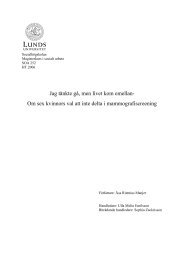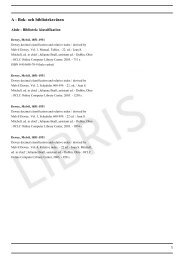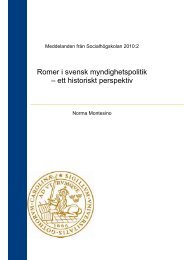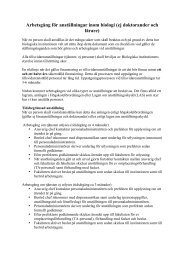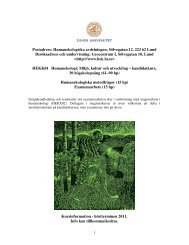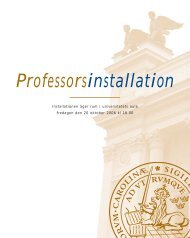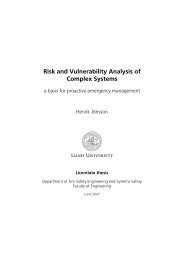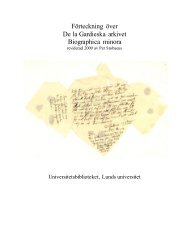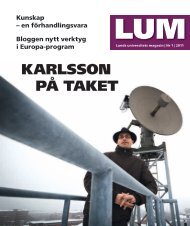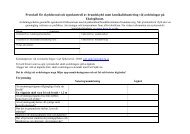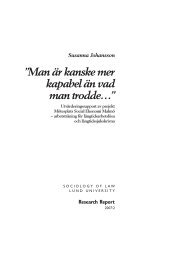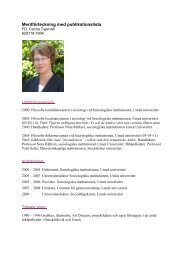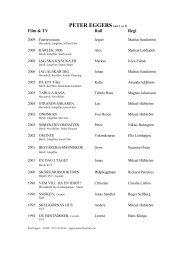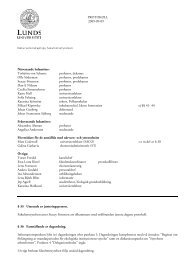The Return of Piracy: Decolonization and International Relations in ...
The Return of Piracy: Decolonization and International Relations in ...
The Return of Piracy: Decolonization and International Relations in ...
You also want an ePaper? Increase the reach of your titles
YUMPU automatically turns print PDFs into web optimized ePapers that Google loves.
<strong>The</strong> <strong>Return</strong> <strong>of</strong> <strong>Piracy</strong>: <strong>Decolonization</strong> <strong>and</strong><br />
<strong>International</strong> <strong>Relations</strong> <strong>in</strong> a Maritime Border<br />
Region (the Sulu Sea), 1959–63<br />
Stefan Eklöf*<br />
Work<strong>in</strong>g Paper No 15<br />
2005<br />
Centre for East <strong>and</strong> South-East Asian Studies<br />
Lund University, Sweden<br />
www.ace.lu.se<br />
*Research Fellow at the Centre for East <strong>and</strong> South-East Asian Studies, Lund University, 2003-2005.<br />
Currently teach<strong>in</strong>g Asian studies at Centre for Asian Studies (CEAS) at Göteborg University.<br />
Stefan.Ekl<strong>of</strong>@ceas.gu.se
WORKING PAPERS IN CONTEMPORARY ASIAN STUDIES<br />
General editor: Pr<strong>of</strong>essor Roger Greatrex<br />
Assistant editor: N<strong>in</strong>a Br<strong>and</strong><br />
Publications <strong>in</strong> this series:<br />
1. Is the world Ready for a Coherent ASEAN+3? / Cesar de Prado Yepes / ISBN 91-975093-0-2<br />
2. Renegotiat<strong>in</strong>g Gender <strong>and</strong> Power: Women’s Organizations <strong>and</strong> Networks <strong>in</strong> Politics<br />
– <strong>The</strong> Ch<strong>in</strong>a Women Mayors’ Association / Qi Wang / ISBN 91-975093-1-0<br />
3. Re-evaluat<strong>in</strong>g Preventive Diplomacy <strong>in</strong> Southeast Asia / J. Michael Tivayanond /<br />
ISBN 91-975093-2-9<br />
4. <strong>The</strong> Role <strong>of</strong> Law <strong>in</strong> Contemporary Indonesia / Mason C. Hoadley / ISBN 91-975093-3-7<br />
5. Clos<strong>in</strong>g the Digital Divide: Southeast Asia’s Path towards a Knowledge Society / Hans-Dieter Evers<br />
<strong>and</strong> Solvay Gerke / ISBN 91-975093-4-5<br />
6. De-colonis<strong>in</strong>g Indonesian Historiography / Henk Schulte Nordholt / ISBN 91-975093-5-3<br />
7. Path Dependence, Change, Creativity <strong>and</strong> Japan’s Competitiveness / Cornelia Storz / ISBN 91-<br />
975093-6-1<br />
8. Ch<strong>in</strong>a Rega<strong>in</strong><strong>in</strong>g Position as Source <strong>of</strong> Learn<strong>in</strong>g / Jon Sigurdson / ISBN 91-975093-7-X<br />
9. Prosper<strong>in</strong>g on Crime: Money Launder<strong>in</strong>g <strong>and</strong> F<strong>in</strong>ancial Crises / Guilhem Fabre /<br />
ISBN 91-975093-8-8<br />
10. Implement<strong>in</strong>g anticorruption <strong>in</strong> the PRC – Patterns <strong>of</strong> selectivity / Flora Sapio /<br />
ISBN 91-975093-9-6<br />
11. Shap<strong>in</strong>g the Future <strong>of</strong> Asia – Chiang Kai-shek, Nehru <strong>and</strong> Ch<strong>in</strong>a-India <strong>Relations</strong> Dur<strong>in</strong>g the Second<br />
World War Period / Guido Samarani / ISBN 91-975726-0-8<br />
12. <strong>The</strong> Consumer Citizen <strong>in</strong> Contemporary Ch<strong>in</strong>a / Beverley Hooper / ISBN 91-975726-1-6<br />
13. Def<strong>in</strong><strong>in</strong>g Southeast Asia <strong>and</strong> the Crisis <strong>in</strong> Area Studies: Personal Reflections on a Region / Victor T.<br />
K<strong>in</strong>g / ISBN 91-975726-2-4<br />
14. Women <strong>in</strong> Politics <strong>in</strong> Thail<strong>and</strong> / Kazuki Iwanaga / ISBN 91-975726-3-2<br />
15. <strong>The</strong> <strong>Return</strong> <strong>of</strong> <strong>Piracy</strong>: <strong>Decolonization</strong> <strong>and</strong> <strong>International</strong> <strong>Relations</strong> <strong>in</strong> a Maritime Border Region (the<br />
Sulu Sea), 1959-63 / Stefan Eklöf / ISBN 91-975726-4-0<br />
This work<strong>in</strong>g paper is published by the Centre for East <strong>and</strong> South-East Asian Studies, Lund University.<br />
<strong>The</strong> views expressed here<strong>in</strong>, however, are those <strong>of</strong> the author, <strong>and</strong> do not represent any <strong>of</strong>ficial view <strong>of</strong><br />
the Centre or its staff.<br />
ISSN: 1652-4128<br />
ISBN: 91-975726-4-0<br />
Layout: Petra Francke, Lund University Information Office<br />
Pr<strong>in</strong>ted <strong>in</strong> Sweden by Lund University, Media-Tryck, 2005<br />
© Stefan Eklöf
Abstract<br />
<strong>Piracy</strong> <strong>in</strong> Southeast Asia is generally believed to have decl<strong>in</strong>ed dramatically<br />
with the advance <strong>of</strong> steam navigation <strong>and</strong> colonial expansion <strong>in</strong> the latter half<br />
<strong>of</strong> the n<strong>in</strong>eteenth century <strong>and</strong> then to have been all but ext<strong>in</strong>ct for most <strong>of</strong> the<br />
twentieth century. However, <strong>in</strong> several parts <strong>of</strong> the region, particularly the<br />
Southern Philipp<strong>in</strong>es <strong>and</strong> Eastern Malaysia, piracy <strong>and</strong> maritime raid<strong>in</strong>g<br />
returned on a significant scale <strong>in</strong> the aftermath <strong>of</strong> World War II <strong>and</strong> have<br />
s<strong>in</strong>ce then cont<strong>in</strong>ued more or less unabated. Draw<strong>in</strong>g on British archival<br />
sources from the late colonial period the paper discusses the character <strong>of</strong>, <strong>and</strong><br />
reasons for, the surge <strong>in</strong> piracy <strong>and</strong> armed raids <strong>in</strong> the waters <strong>of</strong>f the east coast<br />
<strong>of</strong> British North Borneo (Sabah) <strong>in</strong> the 1950s <strong>and</strong> early 1960s. It is argued<br />
that, just as dur<strong>in</strong>g the ‘Golden Age’ <strong>of</strong> European piracy <strong>in</strong> the seventeenth<br />
<strong>and</strong> eighteenth centuries, the fluctuations <strong>in</strong> piratical activity are best<br />
expla<strong>in</strong>ed with reference to the different political economies <strong>of</strong> the colonial<br />
<strong>and</strong> post-colonial states responsible for polic<strong>in</strong>g the maritime region.<br />
Keywords<br />
piracy, security, maritime violence, barter trade, smuggl<strong>in</strong>g, colonial period,<br />
political economy, <strong>in</strong>ternational relations, Southeast Asia, Philipp<strong>in</strong>es,<br />
Malaysia, Indonesia, Sulu Sea, Sabah, North Sulawesi.
Contents<br />
Introduction ..................................................................................................1<br />
<strong>The</strong> <strong>Return</strong> <strong>of</strong> <strong>Piracy</strong> .....................................................................................3<br />
Traders, Smugglers <strong>and</strong> Raiders ....................................................................5<br />
<strong>International</strong> Cooperation <strong>and</strong> Priorities........................................................9<br />
Conclusion..................................................................................................11<br />
References ....................................................................................................13
Map: <strong>The</strong> Sulu region 1959–63<br />
(© Isabella Amirell & Stefan Eklöf)
Introduction<br />
Southeast Asia is frequently referred to as one <strong>of</strong> the most piracy-prone<br />
regions <strong>in</strong> the world today. However, <strong>in</strong> spite <strong>of</strong> the great attention that piracy<br />
<strong>in</strong> the Malacca Straits has attracted <strong>in</strong> recent years, the most pirate-<strong>in</strong>fested<br />
part <strong>of</strong> the region – <strong>and</strong>, <strong>in</strong>deed, <strong>of</strong> the world – are the waters <strong>of</strong> the Southern<br />
Philipp<strong>in</strong>es <strong>and</strong> Eastern Malaysia. Over the past twelve years, Philipp<strong>in</strong>e<br />
authorities have recorded over 1,300 cases <strong>of</strong> piracy <strong>and</strong> armed robbery<br />
aga<strong>in</strong>st vessels, ma<strong>in</strong>ly <strong>in</strong> the Southern parts <strong>of</strong> the country, <strong>and</strong> several<br />
hundred cases have been recorded by Malaysian authorities <strong>in</strong> the waters <strong>of</strong>f<br />
Sabah. In the Philipp<strong>in</strong>es alone, 431 people were killed dur<strong>in</strong>g the period<br />
between 1993 <strong>and</strong> 2004, <strong>and</strong> 426 people were reported miss<strong>in</strong>g as a result<br />
<strong>of</strong> the raids. 1<br />
<strong>The</strong> problem is by no means new. At least s<strong>in</strong>ce the early n<strong>in</strong>eteenth<br />
century, observers <strong>of</strong> the region have described the so called ‘Moros’, the<br />
Muslim peoples <strong>of</strong> the Southern Philipp<strong>in</strong>es, as prone to piracy <strong>and</strong><br />
maritime raid<strong>in</strong>g. From the late eighteenth century up to the mid-n<strong>in</strong>eteenth<br />
century, the famous ‘pirate w<strong>in</strong>d’, annual slave raids by Illanun <strong>and</strong> other<br />
Sulu pirates, struck fear <strong>in</strong> the coastal populations throughout Southeast<br />
Asia. 2 Consequently, European observers came to regard piracy as endemic<br />
among the populations <strong>of</strong> the Southern Philipp<strong>in</strong>es, <strong>and</strong> the <strong>in</strong>cl<strong>in</strong>ation to<br />
piracy was even taken as a marker <strong>of</strong> ethnic identity with all Muslim groups<br />
<strong>in</strong> the area be<strong>in</strong>g lumped together as Piratenstämme. 3<br />
Culture <strong>in</strong> itself, however, cannot expla<strong>in</strong> historical developments, <strong>and</strong> the<br />
reasons for the surge <strong>in</strong> piracy <strong>and</strong> raid<strong>in</strong>g – particularly slave raid<strong>in</strong>g – <strong>in</strong><br />
the early n<strong>in</strong>eteenth century are still <strong>in</strong>sufficiently understood. 4 <strong>The</strong> fact that<br />
piracy, among some <strong>of</strong> the ethnic groups <strong>in</strong> the region, seems to be a<br />
legitimate <strong>and</strong> even high-status practice, does not <strong>in</strong> itself expla<strong>in</strong> why piracy<br />
seems to be endemic <strong>in</strong> the region – especially after more than 200 years <strong>of</strong><br />
serious effort to eradicate it by the colonial <strong>and</strong> post-colonial governments.<br />
On the contrary, this circumstance <strong>in</strong> itself needs to be expla<strong>in</strong>ed. Why has<br />
1 Santos (2004: 3), cit<strong>in</strong>g unpublished reports by the Philipp<strong>in</strong>e Coast Guard <strong>and</strong> Navy <strong>and</strong> Sazlan (2002:<br />
3) cit<strong>in</strong>g unpublished reports by Malaysia’s Maritime Enforcement Co-ord<strong>in</strong>ation Centre. By<br />
comparison, the <strong>International</strong> Maritime Bureau, a unit <strong>of</strong> the <strong>International</strong> Chamber <strong>of</strong> Commerce,<br />
reported 189 attacks (actual as well as attempted) <strong>in</strong> the Malacca Straits dur<strong>in</strong>g the same period; see<br />
ICC – <strong>International</strong> Maritime Bureau (2005: 4). Armed raids aga<strong>in</strong>st ships will, for the present purposes,<br />
be designated as ‘piracy’ regardless <strong>of</strong> whether they take place on the high seas or <strong>in</strong> the territorial<br />
waters <strong>of</strong> a state. See ibid (2005: 3) for the major current def<strong>in</strong>itions <strong>of</strong> piracy <strong>and</strong> armed robbery. <strong>The</strong><br />
present discussion, however, excludes cases <strong>of</strong> petty theft aga<strong>in</strong>st ships at berth or anchor, many <strong>of</strong><br />
which are <strong>in</strong>cluded <strong>in</strong> the IMB’s reports.<br />
2 <strong>The</strong> major recent work on this period is Warren (2002).<br />
3 Blumentritt (1882) cited <strong>in</strong> Frake (1998: 49).<br />
4 See Heather Sutherl<strong>and</strong>’s (2004) review <strong>of</strong> Warren’s (2002) work on the subject.<br />
1
the seem<strong>in</strong>gly anachronistic practice <strong>of</strong> piracy not come to an end, or at least<br />
been relatively efficiently suppressed, <strong>in</strong> the Sulu region as it has <strong>in</strong> other<br />
formerly pirate-<strong>in</strong>fested waters such as the east <strong>and</strong> south coasts <strong>of</strong> Ch<strong>in</strong>a, the<br />
Mediterranean <strong>and</strong> the Caribbean? 5 In order to underst<strong>and</strong> this, we need not<br />
only to look at the economic <strong>and</strong> cultural aspects <strong>of</strong> the problem, but also –<br />
<strong>and</strong> above all – the political aspects, especially <strong>in</strong> relation to private maritime<br />
trade. Why do certa<strong>in</strong> national <strong>and</strong> <strong>in</strong>ternational political contexts seem to<br />
favour piratical activity?<br />
Anne Pérot<strong>in</strong>-Dumon has, <strong>in</strong> a thought-provok<strong>in</strong>g article, argued that the<br />
classic age <strong>of</strong> the European pirates – from about 1520 to 1750 – was<br />
conditioned by the commercial policies <strong>of</strong> the major political empires, first<br />
Spa<strong>in</strong> <strong>and</strong> Portugal, then Engl<strong>and</strong> <strong>and</strong> France:<br />
2<br />
Thus, ironically, the hegemonic nature <strong>of</strong> some merchant empires<br />
did much to keep piracy alive. As long as monopolies went along<br />
with commercial wars, piracy simply fluctuated accord<strong>in</strong>g to the<br />
degree <strong>of</strong> a state’s authority at sea. It was the l<strong>in</strong>kage between trade,<br />
war, <strong>and</strong> hegemonic policies that engendered a cycle <strong>in</strong> which<br />
smuggl<strong>in</strong>g <strong>and</strong> piracy alternated. [...] To elim<strong>in</strong>ate piracy as a<br />
phenomenon, however, trade monopoly had to be given up<br />
altogether. This was a policy toward which Engl<strong>and</strong>, France, <strong>and</strong><br />
Spa<strong>in</strong> only gradually moved till the second half <strong>of</strong> the eighteenth<br />
century. 6<br />
<strong>Piracy</strong> – whether <strong>in</strong> the sixteenth century Mediterranean, seventeenth<br />
century Ch<strong>in</strong>a or eighteenth century Caribbean – occurred on the marg<strong>in</strong>s <strong>of</strong><br />
territorially based merchant empires with hegemonic policies. <strong>The</strong>se were<br />
empires that primarily were concerned with assert<strong>in</strong>g their political <strong>and</strong><br />
military hegemony over other states, <strong>and</strong> <strong>in</strong> the mercantilist ideology <strong>of</strong> the<br />
age, trade was seen as a means <strong>of</strong> acquir<strong>in</strong>g the economic means for the<br />
expansion <strong>of</strong> state power. In try<strong>in</strong>g – albeit unsuccessfully – to control <strong>and</strong><br />
monopolise maritime commerce, the states created the favourable conditions<br />
<strong>in</strong> which piracy <strong>and</strong> smuggl<strong>in</strong>g could flourish.<br />
Inspired by Pérot<strong>in</strong>-Dumon’s argument, the purpose <strong>of</strong> the present paper<br />
is to explore whether piratical activity was fuelled by state policies <strong>and</strong><br />
5 In 2004, the IMB recorded one attack aga<strong>in</strong>st a steam<strong>in</strong>g ship <strong>in</strong> Ch<strong>in</strong>ese (Hong Kong) waters <strong>and</strong> no<br />
acts <strong>of</strong> piracy <strong>in</strong> the Mediterranean. <strong>The</strong> Caribbean was identified as a piracy prone area, but there<br />
were only five reported cases <strong>of</strong> piracy aga<strong>in</strong>st steam<strong>in</strong>g vessels; see ICC – <strong>International</strong> Maritime<br />
Bureau (2005: 44 <strong>and</strong> 49–54). Even if this figure is doubled to account for underreport<strong>in</strong>g, it is far below<br />
the 96 cases recorded by Philipp<strong>in</strong>e authorities for the first seven months <strong>of</strong> the year.<br />
6 Pérot<strong>in</strong>-Dumon (2001: 48).
<strong>in</strong>ternational relations <strong>in</strong> the Sulu region <strong>in</strong> the late 1950s <strong>and</strong> early 1960s.<br />
<strong>The</strong> <strong>Return</strong> <strong>of</strong> <strong>Piracy</strong><br />
As the title <strong>of</strong> this paper <strong>in</strong>dicates, piracy <strong>in</strong> the Sulu region was actually<br />
rather efficiently suppressed for a period dur<strong>in</strong>g the late colonial era from<br />
about 1915 to 1941. With the aid <strong>of</strong> steam gunboats, the Spanish, Dutch<br />
<strong>and</strong> British navies managed already <strong>in</strong> the second half <strong>of</strong> the n<strong>in</strong>eteenth<br />
century to put an end to the large scale raid<strong>in</strong>g <strong>of</strong> the Sulu pirates, but they<br />
never managed to suppress piracy <strong>and</strong> coastal raid<strong>in</strong>g on a smaller – but still<br />
frequent – scale. Spa<strong>in</strong> never ga<strong>in</strong>ed control <strong>of</strong> the southern parts <strong>of</strong> the<br />
Philipp<strong>in</strong>e archipelago <strong>and</strong> Dutch control <strong>of</strong> the waters <strong>of</strong> Eastern Indonesia<br />
was <strong>in</strong>complete. In Sabah, the British North Borneo Company was<br />
adm<strong>in</strong>istratively <strong>and</strong> f<strong>in</strong>ancially weak <strong>and</strong> unable to prevent piracy <strong>and</strong><br />
raid<strong>in</strong>g by Sulus along its coast until the end <strong>of</strong> the n<strong>in</strong>eteenth century. 7<br />
It was only after Spa<strong>in</strong> ceded its Philipp<strong>in</strong>e colony to the United States <strong>in</strong><br />
1898 that Sulu piracy was efficiently suppressed. After a surge <strong>in</strong> piratical<br />
activity <strong>in</strong> the first decade <strong>of</strong> the twentieth century, the Americans resumed<br />
anti-piracy patrols <strong>in</strong> the area <strong>and</strong> through the deployment <strong>of</strong> gunboats, Sulu<br />
piracy was promptly eradicated. 8 In the subsequent years, the American<br />
‘pacification’ campaign brought the Southern Philipp<strong>in</strong>es under central<br />
government control, <strong>and</strong> some 7,000 firearms were collected from outlaw<br />
elements. 9 <strong>The</strong> task <strong>of</strong> ma<strong>in</strong>ta<strong>in</strong><strong>in</strong>g law <strong>and</strong> order <strong>in</strong> the region was delegated<br />
to the Philipp<strong>in</strong>e Constabulary, a police force which had been set up by the<br />
Americans <strong>in</strong> 1901. <strong>The</strong> outcome was that law <strong>and</strong> order was successfully<br />
ma<strong>in</strong>ta<strong>in</strong>ed <strong>in</strong> the region until the outbreak <strong>of</strong> the war with Japan <strong>in</strong> 1941.<br />
After the Philipp<strong>in</strong>es ga<strong>in</strong>ed <strong>in</strong>dependence <strong>in</strong> 1946, however, it seems that<br />
law <strong>and</strong> order was less efficiently upheld <strong>in</strong> the region than dur<strong>in</strong>g the prewar<br />
years. Two immediate legacies <strong>of</strong> the war aga<strong>in</strong> made piracy <strong>and</strong> maritime<br />
raid<strong>in</strong>g a viable occupation for Sulu outlaws. One was the proliferation <strong>of</strong><br />
large numbers <strong>of</strong> modern firearms after the war, <strong>and</strong> the other was the<br />
motorisation <strong>of</strong> sea travel due to the widespread availability <strong>of</strong> <strong>in</strong>expensive<br />
U.S. military surplus eng<strong>in</strong>es. 10 Compared with the pre-war era, these<br />
legacies <strong>of</strong> the war gave the pirates a relative advantage – <strong>in</strong> fire-power <strong>and</strong><br />
7 Warren (2002: 379–385).<br />
8 Hurley (1997: ch. 23).<br />
9 Ibid (1997: ch. 25). See also Russel (1981) for the American campaign.<br />
10 Kiefer (1972: 4) <strong>and</strong> Sidel (1995: 155). See also Hedman & Sidel (2000).<br />
3
velocity – over the authorities that were charged with the task <strong>of</strong> uphold<strong>in</strong>g<br />
law <strong>and</strong> order on the sea.<br />
At the end <strong>of</strong> 1949 the British authorities <strong>in</strong> North Borneo arrested 33<br />
suspected Filip<strong>in</strong>o pirates <strong>in</strong> North Borneo waters, all <strong>of</strong> whom subsequently<br />
were convicted <strong>and</strong> sentenced to between five <strong>and</strong> seven years imprisonment<br />
for ‘dacoity’ <strong>and</strong> related <strong>of</strong>fences. 11 In relation to the sentences, a despatch<br />
from the British Legation <strong>in</strong> Manila to London stated:<br />
4<br />
<strong>Piracy</strong> was the traditional means <strong>of</strong> livelihood <strong>of</strong> the Sulu Moros <strong>in</strong><br />
the n<strong>in</strong>eteenth century… With the advent <strong>of</strong> the Americans <strong>in</strong> the<br />
Philipp<strong>in</strong>es at the end <strong>of</strong> the century conditions improved<br />
considerably. A group <strong>of</strong> American <strong>of</strong>ficers organised the<br />
Philipp<strong>in</strong>e Constabulary which was very successful <strong>in</strong> ma<strong>in</strong>ta<strong>in</strong><strong>in</strong>g<br />
law <strong>and</strong> order <strong>in</strong> Sulu up to the outbreak <strong>of</strong> war with Japan. But<br />
now the American <strong>of</strong>ficers are gone <strong>and</strong> the Philipp<strong>in</strong>e authorities<br />
have not hitherto shown themselves capable <strong>of</strong> ma<strong>in</strong>ta<strong>in</strong><strong>in</strong>g the<br />
constabulary at its old st<strong>and</strong>ards. <strong>The</strong> result among the Moros is, I<br />
fear, that they are revert<strong>in</strong>g to type <strong>and</strong> are aga<strong>in</strong> f<strong>in</strong>d<strong>in</strong>g <strong>in</strong> piracy<br />
<strong>and</strong> smuggl<strong>in</strong>g an easy way <strong>of</strong> mak<strong>in</strong>g a liv<strong>in</strong>g. 12<br />
After a particularly serious raid on the East Borneo town <strong>of</strong> Semporna <strong>in</strong><br />
1954, however, the British set up an armed force <strong>of</strong> mar<strong>in</strong>e police which <strong>in</strong><br />
subsequent years reportedly developed <strong>in</strong>to a ‘very efficient body’. 13 <strong>The</strong><br />
mar<strong>in</strong>e police thus seems to have been capable <strong>of</strong> uphold<strong>in</strong>g law <strong>and</strong> order <strong>in</strong><br />
North Borneo waters between 1954 <strong>and</strong> 1958.<br />
In May 1959, however, a surge <strong>in</strong> piratical attacks <strong>in</strong> North Borneo led the<br />
colonial government to request the assistance <strong>of</strong> the Royal Navy to combat the<br />
problem. In the twelve months between November 1958 <strong>and</strong> October<br />
1959, the North Borneo police recorded 54 piratical attacks, although it was<br />
noted that the real number probably was much higher due to the reluctance<br />
on the part <strong>of</strong> many victims to report attacks to the authorities <strong>in</strong> order to<br />
avoid delays consequent on police <strong>in</strong>terrogation. Rumours, moreover,<br />
circulated <strong>in</strong> the port <strong>of</strong> Tawau, close to the colony’s Indonesian border, <strong>of</strong><br />
s<strong>in</strong>k<strong>in</strong>gs <strong>and</strong> gun battles at sea <strong>in</strong> which convoys <strong>of</strong> traders had fought <strong>of</strong>f<br />
would-be pirates. 14<br />
11 ‘PERSONS, STATED TO BE FROM SITANGKAI’, enclosure to letter from British Legation <strong>in</strong> Manila to<br />
the Secretary <strong>of</strong> State for Foreign Affairs, 24 March 1950, FO 371/84337.<br />
12 British Legation <strong>in</strong> Manila to the M<strong>in</strong>ister <strong>of</strong> State for Foreign Affairs, 24 July 1950, FO 371/84337.<br />
13 Act<strong>in</strong>g Governor <strong>of</strong> North Borneo to the Secretary <strong>of</strong> State for the Colonies, 23 May 1957, FO<br />
371/129539.<br />
14 Governor <strong>of</strong> North Borneo to the Commissioner-General for the United K<strong>in</strong>gdom <strong>in</strong> South-East Asia,<br />
13 November 1959, CO 1030/752. <strong>The</strong> orig<strong>in</strong>al request for naval assistance was made by the Act<strong>in</strong>g
Most <strong>of</strong> the reported attacks, 83 per cent, took place between May <strong>and</strong><br />
August 1959, a period <strong>of</strong> fair weather <strong>in</strong> the Sulu region. Most occurred <strong>in</strong><br />
an area east <strong>of</strong>, or close to, the isl<strong>and</strong> <strong>of</strong> Si-Amil near the Indonesian-North<br />
Borneo maritime boundary, <strong>and</strong> <strong>in</strong> all cases the perpetrators were Sulus from<br />
the Southern Philipp<strong>in</strong>es. <strong>The</strong> pirates used motor kumpits (wooden boats),<br />
<strong>of</strong>ten powered by one or more outboard eng<strong>in</strong>es, <strong>and</strong> <strong>in</strong> most cases they were<br />
armed with firearms or explosives, <strong>in</strong>clud<strong>in</strong>g shotguns, Gar<strong>and</strong><br />
(semiautomatic) rifles, carb<strong>in</strong>es, Sten (submach<strong>in</strong>e) guns, Bren (light<br />
mach<strong>in</strong>e) guns, pistols <strong>and</strong> fish<strong>in</strong>g bombs. In 14 <strong>of</strong> the attacks, firearms or<br />
bombs were used, but there were no reports <strong>of</strong> casualties among the<br />
victims. 15<br />
Traders, Smugglers <strong>and</strong> Raiders<br />
All <strong>of</strong> the victims were Indonesian vessels, mostly orig<strong>in</strong>at<strong>in</strong>g from various<br />
ports <strong>in</strong> Celebes (Sulawesi), Indonesia, on their way to Tawau with cargoes <strong>of</strong><br />
copra (coconut). <strong>The</strong> great majority <strong>of</strong> the victims were relatively small sail<strong>in</strong>g<br />
craft engaged <strong>in</strong> the <strong>in</strong>tensive barter trade <strong>in</strong> the region. In this trade, based<br />
on traditional trad<strong>in</strong>g networks <strong>of</strong> the region, copra from the Philipp<strong>in</strong>es <strong>and</strong><br />
Indonesia – ma<strong>in</strong>ly Celebes – was exported to North Borneo <strong>and</strong> exchanged<br />
for consumer goods, such as cigarettes, eng<strong>in</strong>es, textiles <strong>and</strong> cloth<strong>in</strong>g. <strong>The</strong><br />
kumpits carry<strong>in</strong>g the trade were operated by Filip<strong>in</strong>o <strong>and</strong> Indonesian crews,<br />
but some <strong>of</strong> them were owned <strong>and</strong> f<strong>in</strong>anced by North Borneo<br />
bus<strong>in</strong>essmen. 16<br />
From the Indonesian po<strong>in</strong>t <strong>of</strong> view, most <strong>of</strong> the trade seems to have been<br />
illegal but the central government was unable to control it. Copra traders<br />
were required to obta<strong>in</strong> export licences at their port <strong>of</strong> orig<strong>in</strong>, but as there was<br />
no proper organisation for issu<strong>in</strong>g them, exporters <strong>in</strong>stead reportedly bribed<br />
local <strong>of</strong>ficials to see through their f<strong>in</strong>gers. <strong>The</strong> Indonesian navy tried stop to<br />
the trade by <strong>in</strong>tercept<strong>in</strong>g trad<strong>in</strong>g craft, <strong>of</strong>ten confiscat<strong>in</strong>g both cargo <strong>and</strong><br />
vessel. 17 <strong>The</strong> navy, however, lacked the capacity to enforce the export<br />
regulations efficiently; at one time it was reported that Indonesia only had one<br />
Chief Secretary [<strong>of</strong> the Government <strong>of</strong> North Borneo] to the Comm<strong>and</strong>er-<strong>in</strong> Chief, Far East Station on<br />
22 May 1959.<br />
15 ‘NOTES ON PIRACIES’, October 1959, CO 1030/752.<br />
16 ‘THE BARTER TRADE’, Annex C to ‘Report on the visit <strong>of</strong> the Philipp<strong>in</strong>e Mission to North Borneo to look<br />
<strong>in</strong>to the Barter Trade, July 3 – 11, 1958’, undated, CO 1030/752.<br />
17 R. G. Symons to J. E. Cable, 16 March 1962, DO 169/31, <strong>and</strong> ‘Indonesian Naval Activity’, sav<strong>in</strong>g from<br />
the Governor <strong>of</strong> North Borneo to the Commissioner General for the United K<strong>in</strong>gdom <strong>in</strong> South East Asia,<br />
S<strong>in</strong>gapore, 12 June 1963, FO 371/169741.<br />
5
operat<strong>in</strong>g naval patrol vessel <strong>in</strong> the region. 18<br />
As regards the relation between the Philipp<strong>in</strong>es <strong>and</strong> North Borneo, the<br />
trade was more or less straightforward from the end <strong>of</strong> World War II <strong>and</strong><br />
until 1956. North Borneo was a natural market for copra producers <strong>in</strong> the<br />
Southern Philipp<strong>in</strong>es (as well as <strong>in</strong> Celebes), <strong>and</strong> exporters were attracted to<br />
the British colony by the ‘law <strong>and</strong> order <strong>of</strong> our <strong>in</strong>stitutions <strong>and</strong> by a copra<br />
price which <strong>in</strong>cludes no element <strong>of</strong> levy imposed <strong>of</strong>ficially (or un<strong>of</strong>ficially by<br />
<strong>of</strong>ficials)’, as put by the North Borneo governor <strong>in</strong> 1959. 19 <strong>The</strong> copra –<br />
without any money actually chang<strong>in</strong>g place although accounts were kept <strong>in</strong><br />
Straits Dollars – was exchanged for limited amounts <strong>of</strong> consumer goods that<br />
were imported to the Philipp<strong>in</strong>es.<br />
From 1956, however, the barter trade came to be seen as problematic by<br />
the Philipp<strong>in</strong>e government, as large quantities <strong>of</strong> consumer goods – especially<br />
cigarettes – were be<strong>in</strong>g imported to North Borneo from Hong Kong <strong>and</strong> then<br />
re-exported to the Philipp<strong>in</strong>es <strong>in</strong> exchange for copra <strong>in</strong> an attempt to evade<br />
licens<strong>in</strong>g <strong>and</strong> foreign exchange restrictions imposed by the Philipp<strong>in</strong>e<br />
government. 20 <strong>The</strong> trade was still perfectly legal from the po<strong>in</strong>t <strong>of</strong> view <strong>of</strong> the<br />
North Borneo government, but as the scale <strong>in</strong>creased dur<strong>in</strong>g the second half<br />
<strong>of</strong> the 1950s the Philipp<strong>in</strong>e government’s stance went from unclear to<br />
outright condemn<strong>in</strong>g. In the mid-1950s, an <strong>in</strong>consistently applied rule <strong>of</strong><br />
dubious legal status gave the Southern Filip<strong>in</strong>os the right to barter their<br />
produce for household goods up to a value <strong>of</strong> 1,000 pesos per person.<br />
President Ramon Magsaysay apparently favoured the arrangement <strong>and</strong><br />
<strong>in</strong>tended to issue a special directive regulat<strong>in</strong>g the barter trade, but was<br />
tragically killed <strong>in</strong> a plane crash <strong>in</strong> 1957. <strong>The</strong> barter trade was thus left<br />
without proper legal framework, <strong>and</strong> the Philipp<strong>in</strong>e customs authorities<br />
<strong>in</strong>stead began to apply an extensive list, issued by the Central Bank, <strong>of</strong> items<br />
banned to the trade. 21 In January 1959, Magsaysay’s successor, President<br />
Carlos Garcia, moreover, issued a ban on export<strong>in</strong>g copra from the country<br />
to North Borneo, apparently <strong>in</strong> an attempt to curb the smuggl<strong>in</strong>g <strong>of</strong><br />
cigarettes <strong>and</strong> counterfeit pesos <strong>in</strong>to the Philipp<strong>in</strong>es. 22 <strong>The</strong> ban, together with<br />
<strong>in</strong>tensified naval patroll<strong>in</strong>g <strong>and</strong> efforts to regulate the barter trade, <strong>in</strong>itially<br />
had the effect <strong>of</strong> br<strong>in</strong>g<strong>in</strong>g the trade to a virtual st<strong>and</strong>still, but it gradually<br />
18 Governor <strong>of</strong> North Borneo to the Commissioner-General for the United K<strong>in</strong>gdom <strong>in</strong> South-East Asia,<br />
13 November 1959, CO 1030/752.<br />
19 Ibid.<br />
20 ‘ANGLO/PHILIPPINE TALKS: Economic Aspects <strong>of</strong> Philipp<strong>in</strong>e Interests <strong>in</strong> North Borneo’, undated, DO<br />
169/32.<br />
21 THE BARTER TRADE’, Annex C to ‘Report on the visit <strong>of</strong> the Philipp<strong>in</strong>e Mission to North Borneo to look<br />
<strong>in</strong>to the Barter Trade, July 3 – 11, 1958’, undated, CO 1030/752.<br />
22 ‘FROM MANILA TO FOREIGN OFFICE’, 23 September 1959, CO 1030/752.<br />
6
evived aga<strong>in</strong> dur<strong>in</strong>g 1959 as the Philipp<strong>in</strong>e authorities were unable to<br />
uphold the ban. 23<br />
<strong>The</strong> British were not only concerned that the Philipp<strong>in</strong>e efforts to quench<br />
the barter trade would have negative consequences for the trade <strong>and</strong> economy<br />
<strong>of</strong> North Borneo, but also feared that it might br<strong>in</strong>g about an <strong>in</strong>crease <strong>in</strong><br />
piratical activity as Sulu barter traders – or ‘smugglers’ as seen from the<br />
Philipp<strong>in</strong>e perspective – were deprived <strong>of</strong> their livelihood <strong>and</strong> thus might<br />
revert to ‘their traditional occupation <strong>of</strong> piracy’. 24 <strong>The</strong> problem did <strong>in</strong>deed<br />
cont<strong>in</strong>ue <strong>in</strong> spite <strong>of</strong> the efforts <strong>of</strong> the British authorities, <strong>and</strong> <strong>in</strong> 1960, 42<br />
piracies were reported to the British authorities. In the follow<strong>in</strong>g year, the<br />
maraud<strong>in</strong>g reached a post-war record <strong>of</strong> 97 pirate attacks with eight people<br />
killed <strong>and</strong> 45 wounded or miss<strong>in</strong>g. In 1962, the number <strong>of</strong> reported<br />
piracies decl<strong>in</strong>ed to 39 with four people killed <strong>and</strong> three wounded, but on<br />
the other h<strong>and</strong> there was a sharp <strong>in</strong>crease <strong>in</strong> the number <strong>of</strong> armed raids on<br />
coastal settlements <strong>in</strong> North Borneo. <strong>The</strong>re were 20 armed raids <strong>in</strong> 1962<br />
result<strong>in</strong>g <strong>in</strong> the kill<strong>in</strong>g <strong>of</strong> at least eight people. 25 <strong>The</strong> most serious raid took<br />
place on 20 July at Kunak, a timber camp on the East coast <strong>of</strong> North Borneo:<br />
<strong>The</strong> raid began about 1740 hours [...] when a vessel (technically a<br />
”kumpit”, but more like a Ch<strong>in</strong>ese launch <strong>in</strong> appearance <strong>and</strong> about<br />
24 feet long) approached Kunak from the Semporna Channel. It<br />
had a ”kajang” cover<strong>in</strong>g, badly ma<strong>in</strong>ta<strong>in</strong>ed. At the time the<br />
government launch ”Rusakan” was alongside the steps <strong>of</strong> the wharf,<br />
<strong>and</strong> the British Borneo Timber Company log tow<strong>in</strong>g boat,<br />
”Darvel Bay”, was alongside the longest part <strong>of</strong> the wharf. As the<br />
”kumpit” came alongside the ”Rusakan”, the muzzles <strong>of</strong> four rifles<br />
appeared over its side. <strong>The</strong> occupants <strong>of</strong> the ”kumpit” opened fire<br />
<strong>and</strong> <strong>in</strong> the first burst killed the Eng<strong>in</strong>eer <strong>of</strong> the ”Rusakan”, who<br />
was sitt<strong>in</strong>g on the forward deck, <strong>and</strong> wounded two children also on<br />
deck. <strong>The</strong> two sailors, the Eng<strong>in</strong>eer’s wife <strong>and</strong> one <strong>of</strong> the sailor’s<br />
wives jumped <strong>in</strong>to the sea. <strong>The</strong> serang (skipper) was wounded <strong>in</strong><br />
the left arm as he also jumped for the sea. <strong>The</strong> kumpit then pulled<br />
up to the wharf. Four raiders ran across the wharf to the ”Darvel<br />
Bay”, which had its eng<strong>in</strong>e runn<strong>in</strong>g, shot four members <strong>of</strong> the<br />
crew <strong>and</strong> did some damage to the eng<strong>in</strong>e. One man returned to the<br />
”Rusakan”, smashed the copper pipes <strong>of</strong> the eng<strong>in</strong>e, tore out the<br />
radio <strong>and</strong> transferred it <strong>and</strong> the ”Rusakan’s” b<strong>in</strong>oculars to the<br />
23 ‘Extract from Monthly Intelligence Report – February, 1959’, undated, CO 1030/752.<br />
24 ‘Extract from monthly Intelligence Report for January, 1959 – North Borneo’, undated, CO 1030/752.<br />
25 ‘PIRACIES AND ARMED RAIDS’, note attached to sav<strong>in</strong>g from the Governor <strong>of</strong> North Borneo to the<br />
Secretary <strong>of</strong> State for the Colonies, 8 January 1963, CO 1030/1660.<br />
7
8<br />
kumpit. While one raider stayed <strong>in</strong> the kumpit, the rest, some<br />
seven <strong>in</strong> number, advanced from the wharf, with two fir<strong>in</strong>g up the<br />
road, while others entered the shops near the wharf <strong>and</strong> forced<br />
local people to carry goods <strong>and</strong> money back to the kumpit. <strong>The</strong><br />
telephone-l<strong>in</strong>e was cut <strong>and</strong> an attempt was made to launch the<br />
Mostyn Estates launch ”Luc<strong>in</strong>da”. This was unsuccessful, as it was<br />
locked up. <strong>The</strong> raiders then stove <strong>in</strong> the boat <strong>and</strong> damaged the<br />
eng<strong>in</strong>e. [...]<br />
After the raiders had loaded their boat, they saw a Ch<strong>in</strong>ese launch<br />
com<strong>in</strong>g <strong>in</strong> round the coral. <strong>The</strong>y <strong>in</strong>tercepted it, tied up their own<br />
boat to it, told the passengers to jump <strong>in</strong>to the sea <strong>and</strong> ordered the<br />
skipper <strong>and</strong> eng<strong>in</strong>eer, named Kamalud<strong>in</strong>, to tow the kumpit out. 26<br />
For the British, the armed raids on the coast were even more serious than<br />
the pirate attacks. Whereas the latter ma<strong>in</strong>ly affected Indonesian barter<br />
traders, the former directly affected the population <strong>of</strong> North Borneo.<br />
Moreover, the raids caused a serious shock to morale all along the east coast <strong>of</strong><br />
the colony, caus<strong>in</strong>g local labourers to drift away. This <strong>in</strong> turn, the British<br />
feared, could have serious implications for the whole economy <strong>of</strong> North<br />
Borneo. 27<br />
<strong>The</strong> British were unable to protect the trade <strong>and</strong> coast <strong>of</strong> its colony from the<br />
raid<strong>in</strong>g activities <strong>of</strong> the Sulu pirates. In the period 1959–62, 61 Filip<strong>in</strong>o<br />
nationals were convicted <strong>of</strong> piracy <strong>in</strong> North Borneo courts, <strong>and</strong> another 27 <strong>of</strong><br />
lesser crimes related to acts <strong>of</strong> piracy, but this apparently did little to stop the<br />
raids. 28 <strong>The</strong> authorities also took a range <strong>of</strong> measures to improve security,<br />
<strong>in</strong>clud<strong>in</strong>g the strengthen<strong>in</strong>g <strong>of</strong> police patrols <strong>and</strong> posts along the coast,<br />
construct<strong>in</strong>g watch towers <strong>and</strong> forts <strong>in</strong> vulnerable places, improv<strong>in</strong>g radio<br />
communications between outly<strong>in</strong>g settlements <strong>and</strong> police posts, temporarily<br />
provid<strong>in</strong>g military garrisons <strong>and</strong> <strong>in</strong>creas<strong>in</strong>g naval patroll<strong>in</strong>g. <strong>The</strong> ma<strong>in</strong><br />
purpose <strong>of</strong> these measures, as the British were well aware, however, was to<br />
boost the morale <strong>of</strong> the population, as there was very little chance <strong>of</strong> the<br />
authorities actually apprehend<strong>in</strong>g the pirates. 29<br />
26 ‘Armed raids along the Coastl<strong>in</strong>e <strong>of</strong> North Borneo’, letter from the Act<strong>in</strong>g Governor <strong>of</strong> North Borneo<br />
to the Comm<strong>and</strong>er-<strong>in</strong>-Chief, Far East Station, 30 July 1962, DO 169/31.<br />
27 Ibid. <strong>and</strong> Comm<strong>and</strong>er-<strong>in</strong>-Chief, Far East Station to Admiralty, 8 August 1962, DO 169/31.<br />
28 ‘PIRACIES AND ARMED RAIDS’, 1963.<br />
29 Governor <strong>of</strong> North Borneo to the Secretary <strong>of</strong> State for the Colonies, 8 January 1963, CO 1030/1660,<br />
<strong>and</strong> North Borneo to the Secretary <strong>of</strong> State for the Colonies, 9 January 1963, FO 371/169740.
<strong>International</strong> Cooperation <strong>and</strong> Priorities<br />
<strong>The</strong> British realised that the only way to rid its waters <strong>and</strong> coast <strong>of</strong> the pirates<br />
was to deal with the pirates at their l<strong>and</strong> bases. <strong>The</strong>se were located <strong>in</strong> the<br />
Southern Philipp<strong>in</strong>es, ma<strong>in</strong>ly <strong>in</strong> the Tawi-Tawi group <strong>of</strong> isl<strong>and</strong>s, some 40<br />
nautical miles (c. 60 km) east <strong>of</strong> the eastern tip <strong>of</strong> North Borneo, <strong>and</strong> any<br />
chance <strong>of</strong> effectively deal<strong>in</strong>g with the pirates clearly required the cooperation<br />
<strong>of</strong> Philipp<strong>in</strong>e authorities. Cooperation with Indonesia, meanwhile, was out <strong>of</strong><br />
the question because <strong>of</strong> its objection to the plan, set for 31 August 1963, <strong>of</strong><br />
form<strong>in</strong>g Malaysia through the merger <strong>of</strong> Malaya with the British colonies <strong>in</strong><br />
North Borneo <strong>and</strong> S<strong>in</strong>gapore. In the beg<strong>in</strong>n<strong>in</strong>g <strong>of</strong> 1963, Indonesia even<br />
declared a policy <strong>of</strong> Confrontation (Konfrontasi) aga<strong>in</strong>st Malaysia <strong>in</strong>volv<strong>in</strong>g<br />
armed <strong>in</strong>cursions along the British <strong>and</strong> later Malaysian border <strong>in</strong> North<br />
Borneo.<br />
Even though British-Philipp<strong>in</strong>e relations <strong>in</strong> pr<strong>in</strong>ciple were friendly <strong>in</strong> the<br />
years lead<strong>in</strong>g up to the form<strong>in</strong>g <strong>of</strong> Malaysia, the possibilities for naval<br />
cooperation between the two countries were hampered by two major<br />
unresolved sovereignty issues. One was the Philipp<strong>in</strong>e claim that its<br />
territorial waters, <strong>in</strong> agreement with the 1898 Spanish-American Treaty <strong>of</strong><br />
Paris, encompassed most <strong>of</strong> the Sulu Sea. <strong>The</strong> British, by contrast, only<br />
recognised the much smaller territorial waters set down <strong>in</strong> the 1958 United<br />
Nations Convention on the Law <strong>of</strong> the Sea, which the United K<strong>in</strong>gdom had<br />
ratified, but not the Philipp<strong>in</strong>es. 30<br />
<strong>The</strong> other dispute concerned the territory <strong>of</strong> British North Borneo itself. In<br />
June 1962, as preparations for the transfer <strong>of</strong> sovereignty <strong>of</strong> North Borneo to<br />
Malaysia <strong>in</strong> the follow<strong>in</strong>g year were underway, the Philipp<strong>in</strong>e President<br />
Diosdado Macapagal unexpectedly announced his country’s claim to the<br />
territory. 31 <strong>The</strong>se unresolved territorial disputes made naval cooperation<br />
difficult, as Great Brita<strong>in</strong> was careful not to enter <strong>in</strong>to any operational or other<br />
agreements that might be <strong>in</strong>terpreted as a tacit recognition <strong>of</strong> the Philipp<strong>in</strong>e<br />
claims.<br />
Aside from the territorial disputes, the two countries also had<br />
fundamentally different views <strong>of</strong> what constituted the ma<strong>in</strong> problems <strong>of</strong><br />
maritime law enforcement <strong>in</strong> the Sulu region. In order to combat the pirates,<br />
the British worked to establish cordial <strong>in</strong>formal relations with the Philipp<strong>in</strong>e<br />
police <strong>and</strong> naval <strong>of</strong>ficers <strong>in</strong> the region, but wished to avoid, at all costs, the<br />
30 ‘Advice to Flag Officer Comm<strong>and</strong><strong>in</strong>g <strong>in</strong> Chief Far East Fleet <strong>in</strong> connection with Station Orders <strong>in</strong><br />
Territorial Limits <strong>and</strong> the Protection <strong>of</strong> Merchant Shipp<strong>in</strong>g’, undated, FO 371/169740.<br />
31 See Noble (1977).<br />
9
sign<strong>in</strong>g <strong>of</strong> any formal agreement for naval cooperation with the Philipp<strong>in</strong>es. 32<br />
<strong>The</strong> Philipp<strong>in</strong>es, on their part, proposed a formal agreement between Great<br />
Brita<strong>in</strong> <strong>and</strong> the Philipp<strong>in</strong>es similar to the one which the country had signed<br />
with Indonesia <strong>in</strong> 1960 – or, alternatively, exp<strong>and</strong><strong>in</strong>g that agreement to a<br />
trilateral agreement. <strong>The</strong> purposes <strong>of</strong> the Indonesian-Philipp<strong>in</strong>e agreement<br />
was to eradicate piracy, <strong>of</strong>fences aga<strong>in</strong>st the security <strong>of</strong> the state, all forms <strong>of</strong><br />
smuggl<strong>in</strong>g (<strong>in</strong>clud<strong>in</strong>g the barter trade) <strong>and</strong> illegal entry. Accord<strong>in</strong>g to the<br />
British, however, the focus <strong>in</strong> implement<strong>in</strong>g the agreement was all on the<br />
smuggl<strong>in</strong>g problem:<br />
10<br />
<strong>The</strong> Philipp<strong>in</strong>e Navy, <strong>in</strong> conjunction with the Indonesian<br />
authorities, are active <strong>in</strong> harass<strong>in</strong>g barter traders, <strong>and</strong> display a<br />
comprehensive knowledge <strong>of</strong> trad<strong>in</strong>g craft. However, the take little<br />
<strong>in</strong>terest <strong>in</strong> other unlawful pursuits entail<strong>in</strong>g loss <strong>of</strong> life <strong>and</strong><br />
property <strong>and</strong> show an ignorance <strong>of</strong> raiders. 33<br />
<strong>The</strong> British therefore were <strong>of</strong> the op<strong>in</strong>ion that such an agreement would be<br />
more to the detriment <strong>of</strong> the traders than to the pirates <strong>and</strong> raiders. <strong>The</strong>y,<br />
moreover, foresaw operational problems with jo<strong>in</strong>t patroll<strong>in</strong>g stemm<strong>in</strong>g from<br />
different perceptions <strong>of</strong> the local craft that would be stopped. <strong>The</strong> Filip<strong>in</strong>os<br />
were likely to <strong>in</strong>sist that the crews were smugglers who should be shot<br />
whereas the British were likely to <strong>in</strong>sist that they were traders who should be<br />
released. 34<br />
In mid-March 1963, a group <strong>of</strong> North Borneo government <strong>of</strong>ficials <strong>and</strong><br />
British naval <strong>of</strong>ficers visited the Philipp<strong>in</strong>es for exploratory talks on Anglo-<br />
Philipp<strong>in</strong>e naval cooperation, but still with the aim <strong>of</strong> avoid<strong>in</strong>g any formal<br />
agreement or additional commitments. It was clear from the talks that the<br />
problem <strong>of</strong> cigarette smuggl<strong>in</strong>g <strong>and</strong> its detrimental effect on the national<br />
economy was the ma<strong>in</strong> priority for the Filip<strong>in</strong>os. Although the talks were<br />
conducted <strong>in</strong> a constructive <strong>and</strong> friendly atmosphere, the British realised that<br />
unless they showed their will<strong>in</strong>gness to cooperate <strong>in</strong> controll<strong>in</strong>g the cigarette<br />
smuggl<strong>in</strong>g, they could expect no cooperation from the Filip<strong>in</strong>os <strong>in</strong> the<br />
prevention <strong>of</strong> piracy <strong>and</strong> armed raids on the coasts <strong>of</strong> North Borneo, which<br />
<strong>in</strong> Philipp<strong>in</strong>e eyes was a ‘comparatively m<strong>in</strong>or issue’. 35<br />
32 Governor <strong>of</strong> North Borneo to the Secretary <strong>of</strong> State for the Colonies, 8 January 1963, CO 1030/1660.<br />
33 ‘PIRACIES AND ARMED RAIDS’, 1963.<br />
34 F. A. Warner to T. Peters, 12 June 1963, DO 169/33.<br />
35 ‘ANGLO-PHILIPPINE NAVAL COOPERATION. REPORT OF A MEETING HELD AT PHILIPPINE NAVAL<br />
HEADQUARTERS, MANILA, 15th MARCH, 1963’, Annex B to ‘REPORT BY LIEUTENANT COMMANDER P.A.<br />
WOOLLINGS R.N. ON HIS VISIT TO THE PHILIPPINES 11TH – 22ND MARCH 1963’, undated, CO<br />
1030/1660.
Follow<strong>in</strong>g the talks, the Philipp<strong>in</strong>e authorities did take some measures to<br />
curb piratical activity, <strong>in</strong>clud<strong>in</strong>g <strong>in</strong>creased patrol activity <strong>in</strong> the Tawi-Tawi<br />
area <strong>and</strong>, notably, the kill<strong>in</strong>g <strong>of</strong> one <strong>of</strong> the pr<strong>in</strong>ciple gang leaders, Amak, a<br />
fearsome, one-eyed outlaw who had been <strong>in</strong>volved <strong>in</strong> several <strong>of</strong> the armed<br />
raids on the coast <strong>of</strong> North Borneo. <strong>The</strong> campaign, however, was not<br />
primarily carried out <strong>in</strong> order to appease the British, even though the<br />
Filip<strong>in</strong>os apparently tried to use the clean-up as a barga<strong>in</strong><strong>in</strong>g chip <strong>in</strong> order to<br />
ga<strong>in</strong> more cooperation <strong>in</strong> controll<strong>in</strong>g the cigarette smuggl<strong>in</strong>g. Rather, it seems<br />
that a tour by British <strong>and</strong> Philipp<strong>in</strong>e <strong>of</strong>ficers <strong>of</strong> the Sulu region <strong>in</strong> March<br />
1963 prompted the Filip<strong>in</strong>os to try to curb the lawlessness <strong>and</strong> prevalent<br />
corruption <strong>in</strong> the local Constabulary forces. 36 <strong>The</strong> Philipp<strong>in</strong>e action<br />
contributed to a decl<strong>in</strong>e <strong>in</strong> piratical activity, <strong>and</strong> especially armed raids, <strong>in</strong><br />
North Borneo but piracies nevertheless cont<strong>in</strong>ued right up until the end <strong>of</strong><br />
British rule <strong>in</strong> the territory <strong>in</strong> August 1963.<br />
Conclusion<br />
After hav<strong>in</strong>g been relatively successfully suppressed dur<strong>in</strong>g the period <strong>of</strong><br />
American colonialism <strong>in</strong> the Philipp<strong>in</strong>es, piracy <strong>and</strong> maritime raid<strong>in</strong>g<br />
returned to the Sulu region <strong>in</strong> the years follow<strong>in</strong>g World War II <strong>and</strong><br />
Philipp<strong>in</strong>e <strong>in</strong>dependence <strong>in</strong> 1946. <strong>The</strong> situation grew <strong>in</strong>creas<strong>in</strong>gly serious<br />
towards the end <strong>of</strong> the 1950s <strong>and</strong> early 1960s when Sulu pirates attacked<br />
numerous local traders, ma<strong>in</strong>ly from Indonesia, <strong>and</strong> coastal villages <strong>and</strong><br />
settlements on the coasts <strong>and</strong> isl<strong>and</strong>s <strong>of</strong> British North Borneo.<br />
With the raiders, heavily armed <strong>and</strong> equipped with fast motor boats,<br />
com<strong>in</strong>g from the Philipp<strong>in</strong>es, there was little that the British – who were<br />
genu<strong>in</strong>ely concerned about the problem – could do to uphold law <strong>and</strong> order<br />
on the seas. <strong>The</strong> ma<strong>in</strong> priority for the British colonial government was to<br />
guarantee security <strong>in</strong> its territorial waters <strong>in</strong> order that free trade could<br />
flourish <strong>and</strong> br<strong>in</strong>g economic prosperity to the colony. Free trade, however,<br />
largely meant import<strong>in</strong>g copra from Indonesia <strong>and</strong> the Philipp<strong>in</strong>es <strong>in</strong><br />
contravention <strong>of</strong> the (<strong>in</strong>efficiently implemented) export regulations <strong>of</strong> those<br />
countries <strong>and</strong> export<strong>in</strong>g cigarettes, an activity which was seen as smuggl<strong>in</strong>g<br />
from the Philipp<strong>in</strong>e perspective. For the Indonesian <strong>and</strong> Philipp<strong>in</strong>e<br />
governments, the ma<strong>in</strong> issue was to control the illegal trade <strong>and</strong> impose taxes<br />
<strong>and</strong> licences on the import <strong>and</strong> export <strong>of</strong> goods <strong>in</strong> <strong>and</strong> out <strong>of</strong> their respective<br />
36 ‘ANGLO-PHILIPPINE TALKS CONCERNING PIRACY AND OTHER ACTIVITIES IN THE SULU AREA’, letter<br />
from Lieutenant Comm<strong>and</strong>er P. A. Wooll<strong>in</strong>gs to the Flag Officer Comm<strong>and</strong><strong>in</strong>g-<strong>in</strong>-Chief, Far Eastern<br />
Fleet, 30 July 1963, DO 169/33.<br />
11
countries. <strong>The</strong> British colonial government, by contrast, only imposed m<strong>in</strong>or<br />
fees on the trade <strong>and</strong> rejected any suggestions that they cooperate with their<br />
neighbours <strong>in</strong> curb<strong>in</strong>g the smuggl<strong>in</strong>g.<br />
In general terms, the failure to achieve efficient naval <strong>and</strong> police cooperation<br />
<strong>in</strong> order to curb piracy was due to a clash between what may be termed the<br />
British ‘trad<strong>in</strong>g state’ on the one side <strong>and</strong> the Indonesian <strong>and</strong> Philipp<strong>in</strong>e<br />
‘political states’ on the other side. 37 <strong>The</strong> former saw free trade as the key to<br />
national (or colonial) advancement <strong>and</strong> the government’s role, <strong>in</strong> that context,<br />
was to provide the <strong>in</strong>stitutions which allowed free trade to flourish –<br />
<strong>in</strong>clud<strong>in</strong>g to ma<strong>in</strong>ta<strong>in</strong> law <strong>and</strong> order on the sea <strong>in</strong> order to secure the free<br />
passage <strong>of</strong> traders <strong>and</strong> goods. For Indonesia <strong>and</strong> the Philipp<strong>in</strong>es, by contrast,<br />
the ma<strong>in</strong> priority was nation-build<strong>in</strong>g <strong>and</strong> to assert central government<br />
control over the vast territories <strong>and</strong> territorial waters <strong>of</strong> their respective<br />
country. In the immediate post-colonial period, moreover, free trade was<br />
viewed by the latter countries with suspicion because <strong>of</strong> its association with<br />
predatory capitalism <strong>and</strong> Western imperialism. For Indonesia, the British<br />
commercial policy <strong>in</strong> North Borneo seemed designed to ma<strong>in</strong>ta<strong>in</strong> the<br />
un<strong>in</strong>terrupted supply <strong>of</strong> cheap raw materials, whereas smuggl<strong>in</strong>g <strong>of</strong> cigarettes<br />
from the territory to the Philipp<strong>in</strong>es deprived the central government <strong>of</strong><br />
considerable <strong>in</strong>comes. For both Indonesia <strong>and</strong> the Philipp<strong>in</strong>es, thus, the<br />
ma<strong>in</strong> priority was to safeguard their borders <strong>and</strong> suppress the trad<strong>in</strong>g<br />
activities which the British encouraged <strong>and</strong> viewed as a corner stone <strong>in</strong> the<br />
colony’s economic development.<br />
<strong>International</strong> relations were further complicated by the Philipp<strong>in</strong>e claim to<br />
Sabah, by different def<strong>in</strong>itions <strong>of</strong> the territorial water limit <strong>and</strong> Indonesia’s<br />
policy <strong>of</strong> Confrontation aga<strong>in</strong>st Malaysia. <strong>The</strong>se matters also illustrated the<br />
Indonesian <strong>and</strong> Philipp<strong>in</strong>e concerns with issues <strong>of</strong> national sovereignty <strong>and</strong><br />
the importance attached to issues <strong>of</strong> maritime borders <strong>and</strong> territories rather<br />
than free trade <strong>and</strong> economic development.<br />
Just as <strong>in</strong> previous <strong>in</strong>stances <strong>of</strong> piratical activity dur<strong>in</strong>g the last 500 years,<br />
piracy <strong>in</strong> the Sulu region re-emerged <strong>in</strong> the mid-twentieth century as a result<br />
<strong>of</strong> the different political economies <strong>of</strong> the states <strong>in</strong>volved. In the clash between<br />
the policies <strong>of</strong> free trade <strong>and</strong> the policies <strong>of</strong> territorial assertation, that is where<br />
the roots <strong>of</strong> piracy – at least <strong>in</strong> one <strong>of</strong> its major forms – can be found. As<br />
long as the differences <strong>in</strong> policies <strong>and</strong> priorities between trad<strong>in</strong>g states <strong>and</strong><br />
political states persist, piracy is likely to persist.<br />
37 Cf. Rosecrance (1986).<br />
12
References<br />
Archival Sources – British National Archives, Kew<br />
Records <strong>of</strong> the Colonial Office, Commonwealth <strong>and</strong> Foreign <strong>and</strong><br />
Commonwealth Offices, Empire Market<strong>in</strong>g Board, <strong>and</strong> related bodies,<br />
1570–1990 (CO).<br />
Records created or <strong>in</strong>herited by the Dom<strong>in</strong>ions Office, <strong>and</strong> <strong>of</strong> the<br />
Commonwealth <strong>Relations</strong> <strong>and</strong> Foreign <strong>and</strong> Commonwealth Offices, 1843–<br />
1990 (DO).<br />
Records created <strong>and</strong> <strong>in</strong>herited by the Foreign Office, 1567–2003 (FO).<br />
Literature<br />
Blumentritt, Ferd (1882) Versuch e<strong>in</strong>er Ethnographie der Philipp<strong>in</strong>en, Gotha,<br />
Germany.<br />
Frake, Charles O. (1998) ‘Abu Sayyaf Displays <strong>of</strong> Violence <strong>and</strong> the<br />
Proliferation <strong>of</strong> Contested Identities Among Philipp<strong>in</strong>e Muslims’, American<br />
Anthropologist 100: 1, pp. 41–54.<br />
Hedman, Eva-Lotta <strong>and</strong> Sidel, John T. (2000) Philipp<strong>in</strong>e Politics <strong>and</strong><br />
Society <strong>in</strong> the Twentieth Century: Colonial legacies, post-colonial trajectories,<br />
London <strong>and</strong> New York: Routledge.<br />
Hurley, Vic ([1936] 1997) Swish <strong>of</strong> the Kris. Republished as e-book at<br />
the Internet web page http://www.bakbakan.com/swishkb.html, version<br />
current at 21 June 2005.<br />
ICC – <strong>International</strong> Maritime Bureau (2005) ‘<strong>Piracy</strong> <strong>and</strong> Armed Robbery<br />
aga<strong>in</strong>st Ships: Annual Report 1st January – 31st December 2004’, Bark<strong>in</strong>g,<br />
Essex: ICC – <strong>International</strong> Maritime Bureau.<br />
Kiefer, Thomas M. (1972) <strong>The</strong> Tausug: Violence <strong>and</strong> Law <strong>in</strong> a Philipp<strong>in</strong>e<br />
Moslem Society, New York etc.: Holt, R<strong>in</strong>ehart <strong>and</strong> W<strong>in</strong>ston.<br />
Noble, Lela Garner (1977) Philipp<strong>in</strong>e Policy toward Sabah: A Claim to<br />
Independence, Tucson, Arizona: <strong>The</strong> University <strong>of</strong> Arizona Press.<br />
Pérot<strong>in</strong>-Dumon, Anne (2001) ‘<strong>The</strong> Pirate <strong>and</strong> the Emperor: Power <strong>and</strong><br />
the Law on the Seas, 1450–1850’, <strong>in</strong> C. R. Pennel (ed.), B<strong>and</strong>its at Sea: A<br />
Pirates Reader, New York <strong>and</strong> London: New York University Press, pp. 25–<br />
54.<br />
Rosecrance, Richard (1986) <strong>The</strong> Rise <strong>of</strong> the Trad<strong>in</strong>g State: Commerce <strong>and</strong><br />
Conquest <strong>in</strong> the Modern World, New York: Basic Books.<br />
13
Russel, Roth (1981) Muddy Glory: America's "Indian wars" <strong>in</strong> the<br />
Philipp<strong>in</strong>es, 1899-1935, W. Hanover, Mass: Christopher Pub. House.<br />
Santos, Eduardo Ma. R. (2004) ‘<strong>Piracy</strong> <strong>and</strong> Armed Robbery Aga<strong>in</strong>st<br />
Ships: Philipp<strong>in</strong>e Perspective’. Unpublished paper for the Workshop on<br />
Maritime Security, Maritime Terrorism <strong>and</strong> <strong>Piracy</strong> <strong>in</strong> Asia, S<strong>in</strong>gapore, 23–<br />
24 September 2004.<br />
Sazlan, Isk<strong>and</strong>ar. ‘Incidents at Sea: Shipjack<strong>in</strong>g, Maritime Mugg<strong>in</strong>gs <strong>and</strong><br />
<strong>The</strong>fts <strong>in</strong> Southeast Asia’. Unpublished paper presented at the Intercargo<br />
Roundtable Discussion on <strong>Piracy</strong>, S<strong>in</strong>gapore, 4 February 2002.<br />
Sidel, John T. (1995) Coercion, capital, <strong>and</strong> the post-colonial state: bossism<br />
<strong>in</strong> the Philipp<strong>in</strong>es, Stanford, Ca., <strong>and</strong> Cambridge: Stanford University Press<br />
<strong>and</strong> Cambridge University Press.<br />
Sutherl<strong>and</strong>, Heather (2004) ‘Review Article: <strong>The</strong> Sulu Zone Revisited’,<br />
Journal <strong>of</strong> Southeast Asian Studies, 35: 1, pp. 133–157.<br />
Warren, James Francis (2002) Iranun <strong>and</strong> Balang<strong>in</strong>gi: Globalization,<br />
Maritime Raid<strong>in</strong>g <strong>and</strong> the Birth <strong>of</strong> Ethnicity, S<strong>in</strong>gapore: S<strong>in</strong>gapore University<br />
Press.<br />
14



